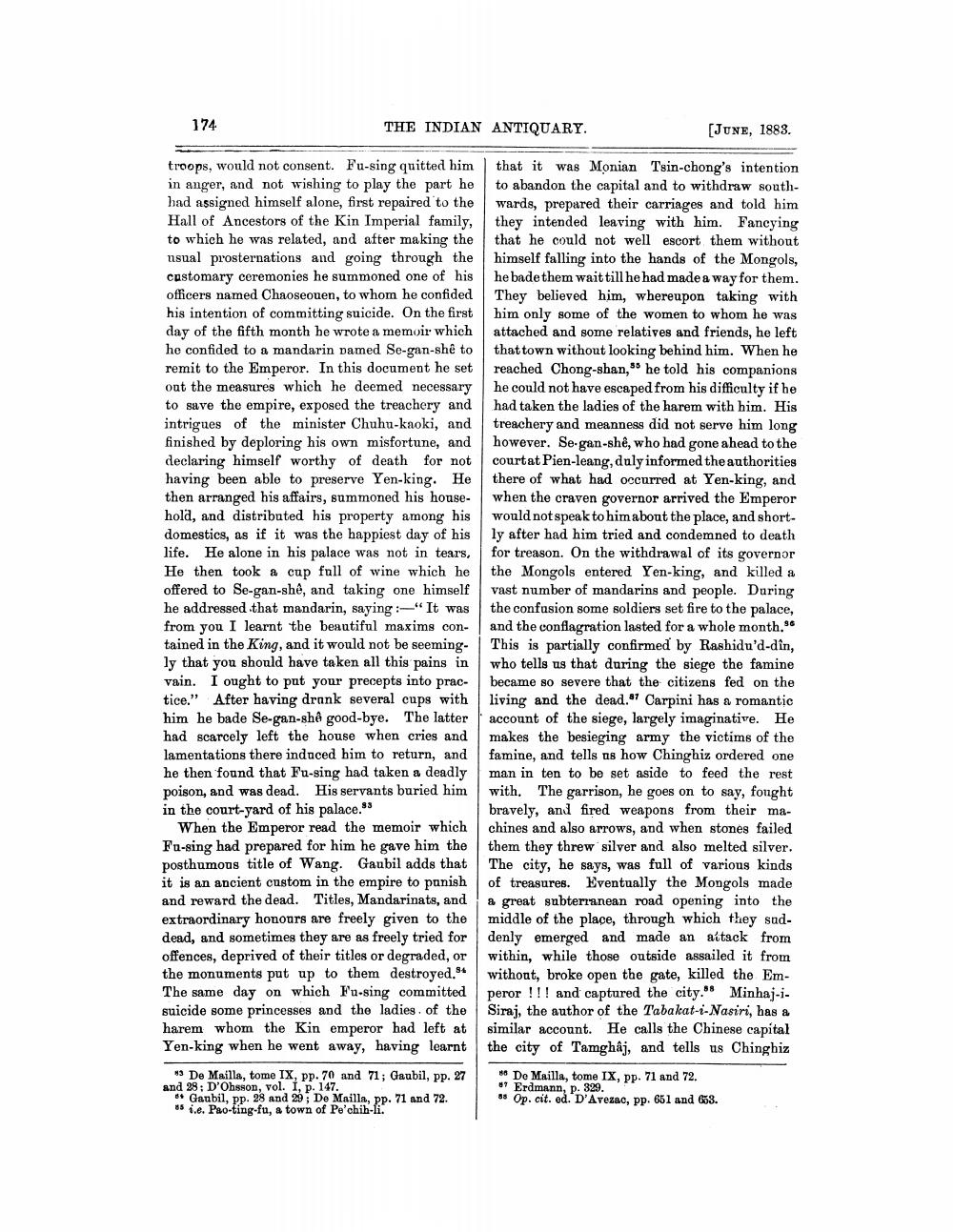________________
174
THE INDIAN ANTIQUARY.
(JUNE, 1883.
troops, would not consent. Fu-sing quitted him that it was Monian Tsin-chong's intention in anger, and not wishing to play the part he to abandon the capital and to withdraw southhad assigned himself alone, first repaired to the wards, prepared their carriages and told him Hall of Ancestors of the Kin Imperial family, they intended leaving with him. Fancying to which he was related, and after making the that he could not well escort them without nsual prosternations and going through the himself falling into the hands of the Mongols, customary ceremonies he summoned one of his he bade them wait till he had made a way for them. officers named Chaoseouen, to whom he confided They believed him, whereupon taking with his intention of committing suicide. On the first him only some of the women to whom he was day of the fifth month he wrote a memoir which attached and some relatives and friends, he left he confided to a mandarin pamed Se-gan-she to that town without looking behind him. When he remit to the Emperor. In this document he set reached Chong-shan," he told his companions out the measures which he deemed necessary he could not have escaped from his difficulty if he to save the empire, exposed the treachery and had taken the ladies of the harem with him. His intrigues of the minister Chuhu-kaoki, and treachery and meanness did not serve him long finished by deploring his own misfortune, and however. Se gan-she, who had gone ahead to the declaring himself worthy of death for not courtat Pien-leang, duly informed the authorities having been able to preserve Yen-king. He there of what had occurred at Yen-king, and then arranged his affairs, summoned his house- when the craven governor arrived the Emperor hola, and distributed his property among his would not speak to him about the place, and shortdomestics, as if it was the happiest day of his ly after had him tried and condemned to death life. He alone in his palace was not in tears, for treason. On the withdrawal of its governor He then took a cup full of wine which he the Mongols entered Yen-king, and killed a offered to Se-gan-shê, and taking one himself vast number of mandarins and people. During he addressed that mandarin, saying "It was the confusion some soldiers set fire to the palace, from you I learnt the beautiful maxims con- and the conflagration lasted for a whole month." tained in the King, and it would not be seeming- This is partially confirmed by Rashidu'd-dîn, ly that you should have taken all this pains in who tells us that during the siege the famine vain. I ought to put your precepts into prac- became so severe that the citizens fed on the tice." After having drank several cups with living and the dead. Carpini has a romantic him he bade Se-gan-shê good-bye. The latter | account of the siege, largely imaginative. He had scarcely left the house when cries and makes the besieging army the victims of the lamentations there induced him to return, and famine, and tells us how Chinghiz ordered one he then found that Fu-sing had taken a deadly man in ten to be set aside to feed the rest poison, and was dead. His servants buried him with. The garrison, he goes on to say, fought in the court-yard of his palace."
bravely, and fired weapons from their maWhen the Emperor read the memoir which chines and also arrows, and when stones failed Fu-sing had prepared for him he gave him the them they threw silver and also melted silver. posthumous title of Wang. Gaubil adds that the city, he says, was full of various kinds it is an ancient custom in the empire to punish of treasures. Eventually the Mongols made and reward the dead. Titles, Mandarinats, and a great subterranean road opening into the extraordinary honours are freely given to the middle of the place, through which they suddead, and sometimes they are as freely tried for denly emerged and made an attack from offences, deprived of their titles or degraded, or within, while those outside assailed it from the monuments put up to them destroyed. without, broke open the gate, killed the EmThe same day on which Fu-sing committed peror !!! and captured the city.** Minhaj-isuicide some princesses and the ladies of the Siraj, the author of the Tabakat-i-Nasiri, has a harem whom the Kin emperor had left at similar account. He calls the Chinese capital Yen-king when he went away, having learnt the city of Tamghaj, and tells us Chinghiz
3 De Mailla, tome IX, pp. 70 and 71; Gaubil, pp. 27 | De Mailla, tome IX, pp. 71 and 72. and 28: D'Ohsson, vol. I, p. 147.
#7 Erdmann, p. 329. 6Gaubil, pp. 28 and 29 ; De Mailla, pp. 71 and 72. * Op.cit. ed. D'Avezac, pp. 651 and 653. * 1.e. Pao-ting-fu, a town of Pe'chih-li.




